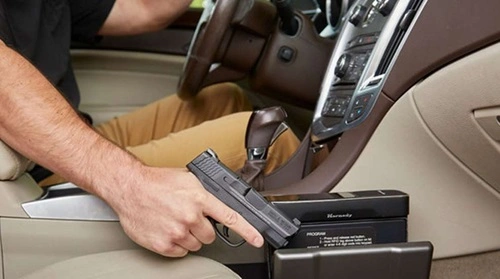No, it is not inherently illegal to carry a gun in your car in the United States, but the legality depends on state laws, the type of firearm, and how it is stored. Gun owners must understand and comply with federal, state, and local regulations regarding the transportation and possession of firearms in vehicles.
Legal Framework for Carrying Guns in Cars
1. Federal Law
Federal law does not prohibit carrying a firearm in a vehicle but defers to state laws for specific regulations. However, the Firearm Owners Protection Act (FOPA) provides certain protections:
- Under FOPA, individuals traveling interstate may transport a firearm as long as it is unloaded, locked in a container separate from ammunition, and carried legally at both the point of origin and destination.
- FOPA does not override state laws, so compliance with local regulations is essential.
2. State Laws
State laws vary significantly when it comes to carrying firearms in vehicles. The laws depend on whether the gun owner has a valid permit, the type of firearm, and how it is stored.
- Permit Requirements:
- In states with constitutional carry laws, such as Texas and Arizona, gun owners may carry a firearm in their car without a permit.
- In states with stricter gun laws, like California and New York, a concealed carry permit or specific firearm transportation requirements may apply.
- Storage Rules:
- Many states require firearms to be unloaded and securely stored in a locked container or trunk if carried without a permit.
- Some states, like Florida, allow a loaded firearm to be carried in the glove box or center console without a permit, as long as it is securely encased.
Open Carry vs. Concealed Carry in Vehicles
1. Open Carry in Cars
Open carry laws determine whether a firearm can be visibly placed in a vehicle. States like Nevada and Kentucky allow open carry in vehicles, provided the firearm is not concealed.
2. Concealed Carry in Cars
Carrying a concealed firearm in a car usually requires a concealed carry permit (CCP) in states with permitting systems. In states with constitutional carry, permits may not be required. However, concealed firearms must often be stored in a specific manner, such as within reach but secured.
Legal Penalties for Non-Compliance
Failing to follow state and local laws regarding firearms in vehicles can lead to severe legal consequences:
1. Misdemeanor Charges: Violating firearm transportation laws is often treated as a misdemeanor, resulting in fines and potential loss of gun rights.
2. Felony Charges: If the firearm is loaded and improperly stored or carried in a restricted area (e.g., school zones), charges can escalate to felonies with harsher penalties, including imprisonment.
3. Firearm Confiscation: Law enforcement may seize firearms transported in violation of local laws.
Special Considerations
1. Traveling Across State Lines
Transporting firearms across state lines introduces additional complexities. While FOPA provides protection, states like New Jersey and Massachusetts have strict gun laws that may result in prosecution despite federal protections. Travelers should research and comply with the laws of each state they pass through.
2. Gun-Free Zones
Federal law prohibits firearms in certain areas, such as schools, military bases, and federal buildings. Carrying a firearm in your car within 1,000 feet of a school zone without a concealed carry permit is a federal offense under the Gun-Free School Zones Act.
3. Employer Policies
Employers may have policies prohibiting firearms in workplace parking lots. In some states, such as Texas, employees have a right to keep guns locked in their personal vehicles, even on company property.
Recent Updates and Trends (2023-2024)
1. Constitutional Carry Expansion
Several states, including Tennessee and Montana, have expanded constitutional carry laws, allowing adults to carry firearms in their cars without permits.
2. Enhanced Penalties for Improper Storage
States like California and Illinois have enacted stricter penalties for improperly storing firearms in vehicles, emphasizing child safety and theft prevention.
3. Smart Storage Laws
Advancements in smart storage technology, such as biometric gun safes, are gaining traction as states encourage or require their use for firearms stored in vehicles.
FAQs About Carrying Guns in Cars
Q1. Is it illegal to carry a loaded gun in my car?
Ans: It depends on the state. Some states allow loaded firearms in cars with or without a permit, while others require the gun to be unloaded and secured.
Q2. Can I transport a gun in my car without a permit?
Ans: Yes, in many states, you can transport an unloaded firearm without a permit if it is stored according to state laws (e.g., locked in a case or trunk).
Q3. Can I carry a gun in my car if I’m traveling across state lines?
Ans: Yes, federal law under FOPA allows interstate transportation of firearms if they are unloaded, locked in a container, and legal at the origin and destination. However, state laws still apply.
Q4. Can my gun be within reach while driving?
Ans: In states with constitutional carry laws or permits, a gun may be accessible. In other states, it must be stored securely and out of reach.
Q5. What should I do if I’m pulled over with a gun in my car?
Ans: Inform the officer that you have a firearm in the vehicle and follow their instructions. Some states, such as Ohio, require drivers to disclose firearm possession during traffic stops.

